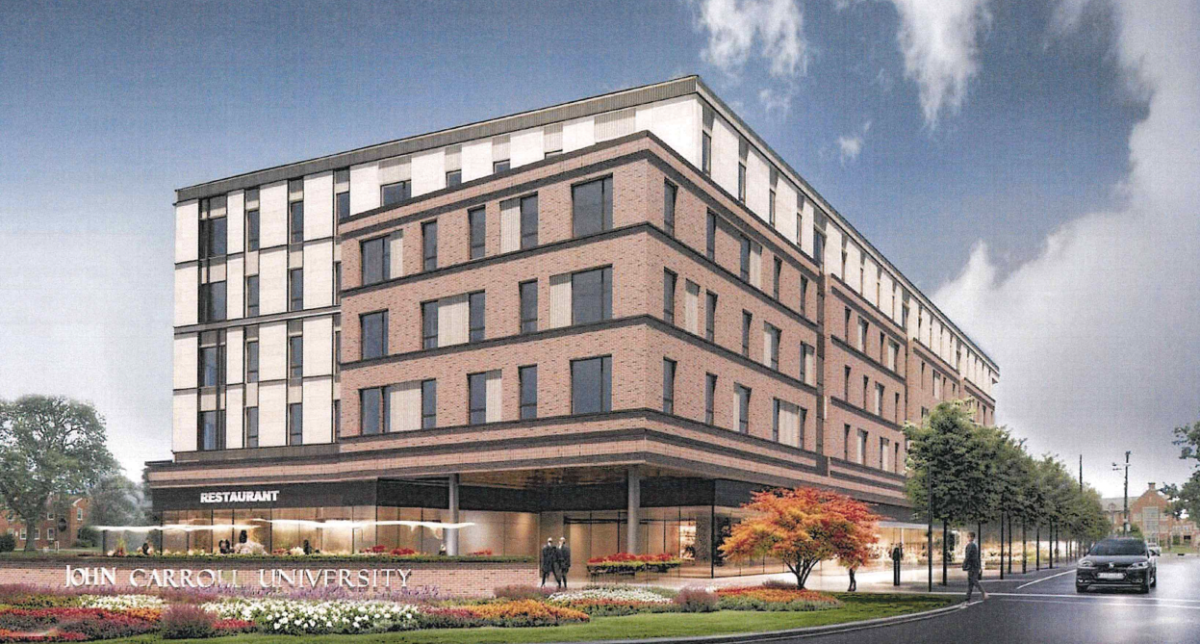University Heights, Ohio—T he City Planning Commission recommended approval of John Carroll University’s $60 million Gateway North redevelopment project on Fairmount Circle on Oct. 10. While the project promises to enhance the area, concerns about parking remain a point of contention as JCU has an “aggressive schedule to break ground in 2025,” said Mayor Michael Brennan.
Back in Dec. 2022, the university announced plans to redevelop this property on Fairmount Circle to include additional retail and commercial development, student housing and parking.
This project was intended to come in three phases. First, a new parking garage would be built to account for lost parking spots with the construction of the Athletic Wellness & Event Center. Second, redevelopment of the northern side of the gateway occupied by Mr. Tire, the remnants of a BP gas station and the commuter lot. Third, JCU’s property on the southern side of the gateway bordering Shaker Heights will be redeveloped.
The commission, chaired by Brennan, promptly moved through the discussions of the renovations at Gesu, which include an outdoor prayer area and a new sign, and the construction of an Aldi at 14100 Cedar Road, though Brennan “would love to see solar” incorporated into the designs. Then, representatives from JCU took to the podium to advocate for the project to move forward. Maura Jochum, chief of staff to the president, delivered opening remarks that emphasized the importance of the Gateway redevelopment project in the university’s “strategy for national growth.”
She said, “In order for us to thrive for generations to come, we must become a destination campus” and “investment in the gateway project is JCU’s commitment to fostering a future where we remain vibrant.”
Jeremiah Swetel, vice president of Facilities and Auxiliary Services, said that the $60 million investment in the project is not just for students, it’s for the surrounding community as well. The first floor of the proposed building will incorporate a multi-use space for students, restaurants, retail amenities and a specialty grocery store; with a range of single occupancy to four-person apartments above. Though, as Swetel predicted, “Parking will invariably become a point of conversation tonight.”
The businesses on the first floor require 186 parking spaces, however, with 99 apartment units and 355 beds in the residential complex, there are only 224 spots available for those students living in the gateway project. Previously, the university proposed building a parking garage, but the commission and residents were opposed to the structure. However, Swetel said, “parking is not a reason why we are doing the gateway project we are doing it for all the benefits of a thriving university.” Brennan voiced concerns over the reduction in parking with the surface lots replacing the garage in the new plan as there are “100 fewer spaces.”
Winifred Weizer, a city council member, expressed displeasure at the new plan and its “sea of parking.” She said, “There is not a lot of room to add more cars, and “a parking garage might solve that problem now and going forward for you,” which is a reasonable concern as Swetel said enrollment is increasing.
Weizer also voiced concern that the new plan placed parking too close to homes. She said, “That 10-foot buffer is nothing.” An elderly resident shared these concerns. His home is adjacent to the parking lot and he feels like the university is “trying to squeeze me out.”
Swetel explained that they predict fewer students will have vehicles on campus in the future and Brennan liked the prospect of fewer students relying on motor vehicles as he is a proponent of a more walkable and bikeable city. Swetel said, “We want to make sure our community impact is huge” and that “we are good partners in the future of the city.”
“We are only asking for enough parking for the project,” he reiterated.
After the commission approved the project, Brennan later said on Facebook “As a city, we want to do our part to put JCU in the best position to succeed and be a strong part of our community for many years to come. This project will help do that.” The university will now seek approval from the University Heights City Council.



